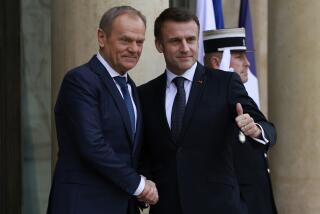Powell Headed to Belgium and Turkey on a Diplomatic Salvage Mission
WASHINGTON — Hoping to repair the damage the war with Iraq has done to transatlantic relations, the Bush administration this week is opening talks with the European Union and Turkey about rebuilding Iraq after the fall of Saddam Hussein.
Secretary of State Colin L. Powell leaves today to discuss the shape of a new Iraqi government as well as an international role in reconstruction and a postwar stabilization force with the EU and NATO, the State Department said Monday.
The visits may prove to be a diplomatic salvage operation after months of deepening divisions that culminated in the collapse last month of Powell’s effort to win U.N. support for using force against Iraq.
The two-day trip to Ankara, Turkey, and Brussels was announced after President Bush held a weekend war council with his national security team. The United States has reached a “critical moment” in planning for the war’s aftermath, State Department spokesman Richard Boucher said Monday.
Powell hopes to meet with the foreign ministers of all major EU and NATO nations, including France and Germany, plus Russia on Thursday in Brussels, although plans were still incomplete, U.S. officials said.
France, Germany and Russia were the most outspoken major powers opposing military intervention in Iraq, and they have continued to criticize the U.S. The Brussels conclave would be the first face-to-face meeting with Powell since the United States and Britain withdrew a resolution authorizing force against Iraq.
Powell said he hopes to reengage Europe on Iraq.
“I want to give them an update on Operation Iraqi Freedom and also begin conversations about our hopes for Iraq in the future, for the people of Iraq, how we can all work together to provide a better life for them and to help them to rebuild their country after decades of devastation by the Hussein regime,” he said at a news conference.
Added a well-placed administration official: “We’re looking for financial commitments, but how much exactly they will be involved in either political or security arrangements after the war still has to be determined.”
For the first time, the State Department said Monday that the United States is exploring ways to involve nations not in the coalition fighting in Iraq in an international “stabilization force” that would police Iraq and patrol borders until new security forces could be created.
But Washington, which is particularly outraged by French Foreign Minister Dominique de Villepin’s refusal last week to say whether he wanted the U.S. or Iraq to win the war, has made it clear it expects the allies to also take steps to repair relations.
“It was an abhorrent statement,” Deputy Secretary of State Richard L. Armitage said in an interview with The Times on Monday. “I’m glad to know that the French foreign minister finds himself so squarely on the side of Saddam Hussein.”
De Villepin, Armitage said, “should be informed of the rule of holes. The first rule of holes: When you’re in one, stop digging.”
In Ankara, Powell will try Wednesday to bridge the gap between Washington and the new Turkish government, which failed to win parliament’s backing to provide access for 62,000 U.S. troops to open a northern front against Iraq.
He will also seek an agreement from Prime Minister Recep Tayyip Erdogan that Turkey will refrain from sending troops to Kurdish-controlled northern Iraq.
America’s top diplomat said he hopes to establish a “common understanding” about northern Iraq. “I want to reassure Turkish leaders that we believe that the work we are doing there now should make it unnecessary for them to consider any incursions in the region,” he said.
In Turkey, polls show overwhelming opposition to the U.S.-led invasion of Iraq.
But tensions flow both ways. The administration last week proposed $1 billion in aid to Turkey as part of the White House’s supplemental budget request, to compensate for economic fallout of a war in neighboring Iraq and to repair ties with the new Islamic government.
But Turkey’s refusal to allow the troops on its soil sparked a strong reaction on Capitol Hill.
House International Relations Committee Chairman Rep. Henry J. Hyde (R-Ill.) and Rep. Tom Lantos of San Mateo, the panel’s ranking Democrat, recommended Monday that the aid be tied to “performance standards relating to Turkey’s economic policies and its role as an ally.”
*
Sonni Efron in Washington and Richard Boudreaux in Turkey contributed to this report.
More to Read
Sign up for Essential California
The most important California stories and recommendations in your inbox every morning.
You may occasionally receive promotional content from the Los Angeles Times.











